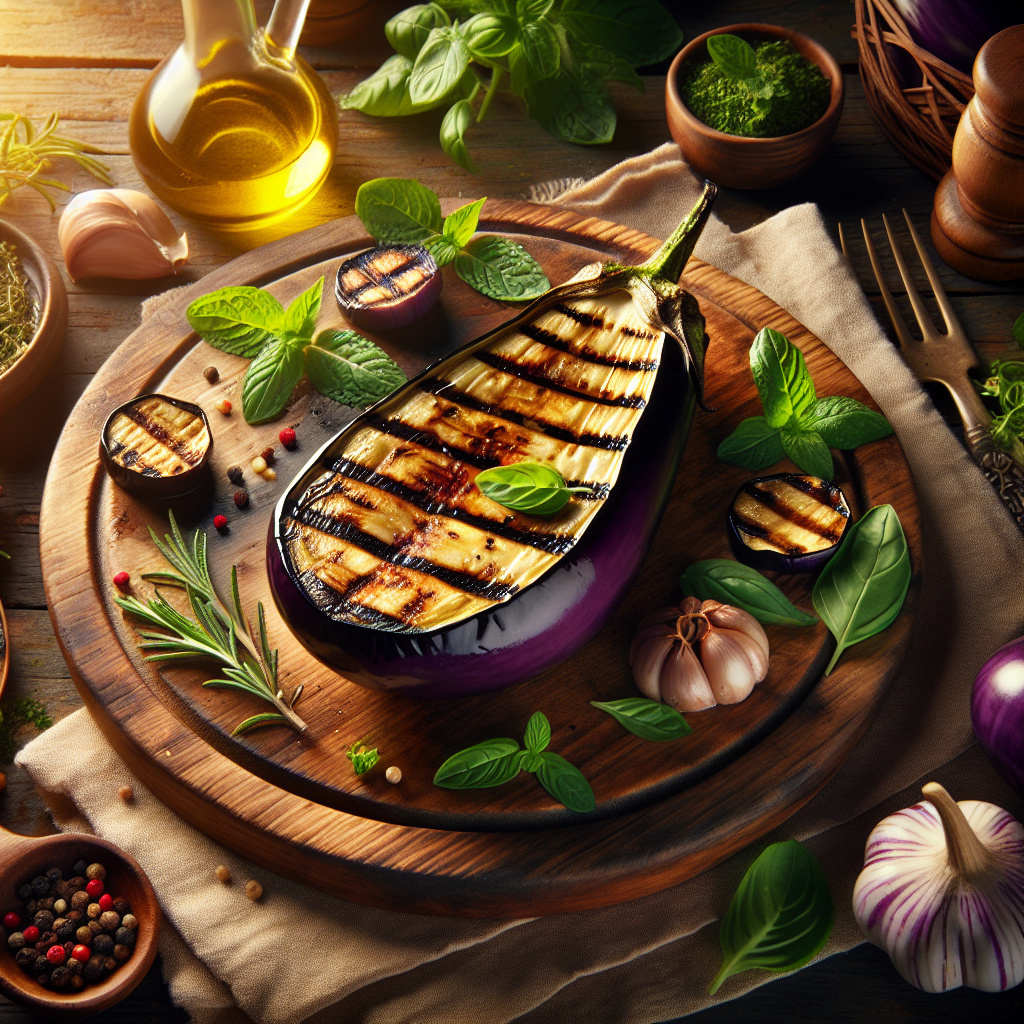Grilling eggplant can be a delicious and healthy way to enjoy this versatile vegetable. Whether you’re a seasoned griller or a novice, this article will guide you through the steps of how to grill eggplant to perfection. From selecting the right eggplant at the grocery store to preparing it for the grill, this article will provide you with all the tips and tricks you need for a successful grilling experience. So grab your apron and fire up the grill, because you’re about to discover the secrets to perfectly grilled eggplant.

Choosing the Right Eggplant
Look for a Fresh and Firm Eggplant
When selecting an eggplant for grilling, it’s important to choose one that is fresh and firm. Avoid eggplants that have soft spots, wrinkled skin, or blemishes. A fresh and firm eggplant will have a smooth and shiny skin, indicating that it is ripe and ready to be grilled.
Select the Right Size
Consider the size of the eggplant when making your selection. Smaller eggplants are usually sweeter and have a more delicate flavor, while larger ones tend to be slightly bitter. Choose an eggplant that suits your taste preferences and the serving size you desire. Keep in mind that larger eggplants may require slightly longer cooking times.
Consider the Shape and Color
The shape and color of an eggplant can also impact its taste and texture when grilled. Look for eggplants that are uniform in shape and have a deep, vibrant color. Avoid eggplants that are overly large or misshapen, as they may have a more fibrous texture. Opt for eggplants with a glossy and rich-colored skin, indicating optimal ripeness.
Preparing the Eggplant
Wash the Eggplant
Before preparing the eggplant for grilling, it is important to wash it thoroughly. Rinse the eggplant under cool running water and use a scrub brush to remove any dirt or debris. This step ensures that the eggplant is clean and ready to be cooked.
Trim the Ends
Next, trim off the ends of the eggplant. Cut off the stem end and discard it, as well as the small portion of the eggplant where the stem was attached. Trimming the ends not only removes any woody or tough parts but also helps the eggplant cook more evenly.
Peeling or Not Peeling
Whether to peel the eggplant or not is a matter of personal preference and the specific recipe you are following. In general, the skin of an eggplant becomes tender when grilled, so it can be left on for added texture. However, if you prefer a softer and smoother texture, or if the skin is particularly thick, you may opt to peel the eggplant before grilling.
Cutting the Eggplant
Decide on the Slices or Chunks
When it comes to cutting the eggplant for grilling, you have the option of slicing it or cutting it into chunks. Slicing the eggplant lengthwise produces long strips that can be grilled to perfection. On the other hand, cutting the eggplant into chunks is great for kebabs or when you want bite-sized pieces.
Consider the Cooking Time
The cooking time of the eggplant can be influenced by how it is cut. Thicker slices or larger chunks will require more time on the grill to cook through, while thinner slices will cook more quickly. Consider the overall cooking time of your recipe and adjust the size and thickness of the eggplant accordingly.
Thickness and Consistency
Another factor to consider when cutting the eggplant is the desired thickness and consistency of the final grilled product. Thicker slices or chunks will result in a more substantial texture, while thinner slices will be more delicate and tender. Choose the thickness that best suits your preference and the dish you are preparing.
Salting the Eggplant
Optional but Recommended
Salting the eggplant before grilling is an optional step, but it is highly recommended. Salting helps to draw out excess moisture from the eggplant, resulting in a firmer texture and enhancing its overall flavor. It also helps to remove any potential bitterness that can be found in certain varieties of eggplant.
Removing Bitterness and Moisture
To salt the eggplant, sprinkle it evenly with salt and let it sit for about 30 minutes. As the salt interacts with the eggplant, it will draw out moisture, which can then be wiped away. This not only removes any bitter compounds but also helps the eggplant retain its shape and prevents it from becoming soggy during grilling.

Marinating the Eggplant
Enhancing Flavor
Marinating the eggplant is an excellent way to add extra flavor and enhance its taste profile. It allows the eggplant to absorb delicious marinade ingredients, making it even more delicious when grilled. Marinating also helps to tenderize the eggplant, resulting in a more flavorful and succulent end result.
Choosing the Right Marinade
When selecting a marinade for your eggplant, consider flavors that complement its natural taste. Citrus-based marinades, such as lemon or orange, can add a refreshing tanginess. Herb-infused marinades, such as rosemary or thyme, can provide a savory twist. You can experiment with various marinades to find your favorite combination.
Allowing Time for Absorption
For the best results, allow the eggplant to marinate for at least 30 minutes to one hour before grilling. This gives the flavors an opportunity to infuse into the eggplant and enhances the overall taste. However, avoid marinating for too long, as the eggplant can become too soft and lose its structure.
Preheating the Grill
Cleaning the Grill Grates
Before preheating the grill, make sure to clean the grates thoroughly. Use a grill brush to remove any residue or debris from previous use. This ensures that the eggplant will not stick to the grates and allows for even cooking and attractive grill marks.
Applying Cooking Oil
To prevent the eggplant from sticking to the grill and to promote a nice charred exterior, it is important to apply cooking oil. Lightly brush both sides of the eggplant slices or chunks with oil, ensuring even coverage. This step also helps to enhance the flavor and moisture retention during grilling.
Adjusting the Temperature
Preheat the grill to medium-high heat before placing the eggplant on it. This temperature allows for a good sear without burning the eggplant. Adjust the heat as needed during grilling to maintain the desired level of browning and to ensure the eggplant cooks evenly.
Grilling the Eggplant
Direct vs Indirect Heat
You have the option of grilling the eggplant over direct or indirect heat, depending on your preference and the recipe you are following. Grilling over direct heat produces a quicker cooking time and more prominent grill marks, while indirect heat allows for a slower and more even cooking process.
Placing the Eggplant on the Grill
When placing the eggplant on the grill, arrange the slices or chunks in a single layer, ensuring they are not overlapping. This allows for even grilling and prevents the eggplant from becoming overcrowded. Leave enough space between each piece to allow for proper heat circulation and to avoid steaming.
Flipping and Rotating
Flip the eggplant slices or chunks halfway through the cooking process to ensure even browning on both sides. You can also rotate them to create crosshatch grill marks for an aesthetically pleasing presentation. Use tongs or a spatula to handle the eggplant gently and avoid piercing or crushing it.
Cooking Time and Internal Temperature
Monitoring the Cooking Time
The cooking time for grilled eggplant can vary depending on the thickness of the slices or chunks, the temperature of the grill, and personal preferences. It is important to monitor the eggplant closely to ensure it is cooked to your desired level of doneness. A general guideline is to cook the eggplant for 4-6 minutes per side, but adjust the time according to your specific needs.
Determining Doneness
To determine if the eggplant is cooked to perfection, you can use a fork or a small knife to pierce it gently. The fork or knife should easily penetrate the flesh, and the eggplant should feel tender but still hold its shape. Avoid overcooking, as the eggplant can become mushy and lose its texture.
Ideal Internal Temperature
Unlike meats, eggplant does not have a specific internal temperature to achieve doneness. Cooking time and visual cues are usually sufficient indicators of readiness. When the eggplant is grilled to the desired doneness, it should appear soft, slightly charred, and have a golden-brown color.
Avoiding Common Mistakes
Avoiding Undercooked Eggplant
Undercooked eggplant can have a bitter taste and a tough texture, which can be unappetizing. To avoid this, make sure to cook the eggplant thoroughly without charring or burning it. Adjust the heat and cooking time as needed to ensure that the eggplant is fully cooked and tender.
Preventing Overcooking
Overcooked eggplant can become mushy and lose its shape and texture. To prevent this, monitor the eggplant closely during grilling and avoid leaving it on the heat for too long. Remove the eggplant from the grill when it is cooked to your desired level and immediately transfer it to a platter or serving dish.
Maintaining Grill Marks
Grill marks not only add visual appeal to the eggplant but also provide a delightful smoky flavor. To maintain the grill marks, avoid moving the eggplant too often while it is cooking. Allow each side to sear for a few minutes before flipping or rotating. This gives the grill marks a chance to form and develop.
Serving and Enjoying
Allowing the Eggplant to Rest
After grilling the eggplant, it is important to allow it to rest for a few minutes before serving. This allows the flavors to settle and the juices to redistribute within the eggplant, resulting in a more flavorful and succulent bite. Resting also helps the eggplant retain its texture and prevents it from becoming too watery.
Enhancing with Seasonings
Before serving, consider enhancing the grilled eggplant with additional seasonings to elevate its flavor. Fresh herbs like basil, parsley, or mint can be sprinkled on top to add freshness and aroma. Drizzling a balsamic reduction or a squeeze of lemon juice can also enhance the taste of the grilled eggplant.
Pairing with Grilled Meats or Veggies
Grilled eggplant is a versatile ingredient that pairs well with various grilled meats and vegetables. Consider serving it alongside grilled chicken, steak, or fish for a complete and satisfying meal. Grilled vegetables like bell peppers, zucchini, or mushrooms can also be combined with the eggplant for a flavorful and colorful medley.
Grilling eggplant can be a delicious and healthy way to enjoy this versatile vegetable. By choosing the right eggplant, preparing it properly, and following these grilling tips, you can create a mouthwatering dish that will impress your family and friends. So fire up the grill, grab some fresh eggplant, and get ready to savor the flavors of summer!
